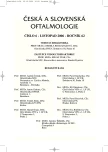-
Medical journals
- Career
Chronic Postoperative Endophthalmitis
Authors: P. Svozílková 1; E. Říhová 1; M. Brichová 1; P. Diblík 1; J. Dvořák 1; J. Šach 2
Authors‘ workplace: Oční klinika VFN a 1. LF UK, Praha přednosta doc. MUDr. B. Kalvodová, CSc. 1; Ústav patologie FNKV a 3. LF UK, Praha přednosta prof. MUDr. V. Mandys, CSc. 2
Published in: Čes. a slov. Oftal., 62, 2006, No. 6, p. 404-410
Overview
Purpose:
To evaluate our experience with the diagnosis and the treatment of chronic postoperative endophthalmitis.Methods:
A retrospective study.Results:
The authors present three cases of chronic postoperative endophthalmitis following cataract surgery. Propionibacterium species has been determined as the causative agent in two patients. All patients were men; the mean age was 75 years (from 73 to 78 years). The mean time period from the cataract operation to the onset of intraocular inflammatory signs was 5 months (from 2 to 9 months). Pars plana vitrectomy with intravitreal administration of antibiotics and intraocular lens explantation with total capsulectomy were performed. This treatment led to the reduction of the intraocular inflammatory reaction and to the improvement of the visual acuity.Conclusion:
The effective treatment of chronic postoperative endophthalmitis caused by Propionibacterium species is a combined operation – intraocular lens explantation with total capsulectomy and pars plana vitrectomy with intravitreal administration of antibiotics.Key words:
postoperative endophthalmitis, Propionibacterium
Labels
Ophthalmology
Article was published inCzech and Slovak Ophthalmology

2006 Issue 6-
All articles in this issue
- Epidemiology of the Endocrine Orbitopathy
- The Contrast Sensitivity Test in Early Detection of Ocular Changes in Children, Teenagers, and Young Adults with Diabetes Mellitus Type I.
- Long-term Functional Effect of Pars Plana Virtrectomy in Complications of Prolipherative Diabetic Retinopathy
- Chronic Postoperative Endophthalmitis
- Our Experience with Sub-Tenon’s Anesthesia in Ophtalmic Surgery
- Dry Eye Syndrome in Patients with Conjunctival Concretions
- Czech and Slovak Ophthalmology
- Journal archive
- Current issue
- Online only
- About the journal
Most read in this issue- Chronic Postoperative Endophthalmitis
- Dry Eye Syndrome in Patients with Conjunctival Concretions
- Epidemiology of the Endocrine Orbitopathy
- Long-term Functional Effect of Pars Plana Virtrectomy in Complications of Prolipherative Diabetic Retinopathy
Login#ADS_BOTTOM_SCRIPTS#Forgotten passwordEnter the email address that you registered with. We will send you instructions on how to set a new password.
- Career

